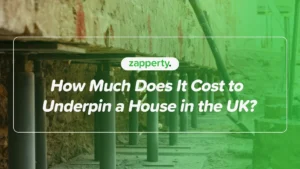Selling a house is a major milestone, but it’s not just about finding a buyer and signing paperwork, it’s also about understanding what tax you might owe. And if you’re not prepared, the tax bill can come as a nasty surprise.
So, how much tax do you pay when you sell your house in the UK? The answer depends on a few key factors: whether it’s your main home, an investment property, or an inherited house. In some cases, you won’t owe a penny. In others, you could face a hefty Capital Gains Tax (CGT) charge.
The good news? There are legal ways to reduce or avoid this tax entirely, if you know what to look for. In this guide, we’ll explain everything in plain English, from CGT rates and reliefs to common exemptions and money-saving tips.
By the end, you’ll know exactly what tax (if any) you owe when selling your property, and how to keep more of your profit in your pocket.
Capital Gains Tax Explained: How Much Will You Pay?
When you sell a property in the UK, Capital Gains Tax (CGT) may apply, but not always. Here’s how it works:
- If you’re selling your main home, you’re likely exempt from CGT (thanks to Private Residence Relief – more on that later).
- If you’re selling a second home, buy-to-let, or an inherited property, CGT applies, and HMRC will want their share.
Who Pays Capital Gains Tax When Selling a House?
CGT is based on your profit, the difference between the price you bought the property for and the price you sell it for, minus allowable deductions. The tax rates in 2025 are:
- 18% for basic-rate taxpayers
- 24% for higher-rate taxpayers
Let’s say you bought a rental property for £200,000 and sold it for £300,000. After deducting legal fees, estate agent costs, and renovations, your taxable gain is £80,000.
- Basic-rate taxpayer: 18% of £80,000 = £14,400
- Higher-rate taxpayer: 24% of £80,000 = £19,20
Ouch! But don’t panic, there are legal ways to reduce this amount.
Who is Exempt from Paying Capital Gains Tax?
Not everyone selling a home needs to pay CGT. You’re exempted from paying capital gains tax if:
- You’re selling your main residence. Private Residence Relief means you won’t owe CGT.
- You’re selling due to divorce or separation. Special rules allow tax-free transfers between spouses.
- You gift your property to a spouse or civil partner. No CGT is due, although Inheritance Tax could apply later.
How to Legally Avoid Capital Gains Tax
Private Residence Relief: When You Don’t Owe Tax
If you’re selling the home you actually live in (your main residence), you’re in luck. The UK government offers Private Residence Relief (PRR), which completely exempts you from CGT, meaning you keep every penny of your sale profits!
For PRR to apply, your home must:
- Be your main place of residence, not a rental or holiday home.
- Have been used exclusively for living purposes, not for running a business.
- Not exceed 5,000 square meters, including the garden.
Let’s say you bought your house 15 years ago for £200,000, and now you’ve sold it for £400,000. That’s a £200,000 profit, but guess what? If this was your main home the entire time, you won’t pay a single penny in CGT!
But what if you’ve lived elsewhere for a while?
If you rented it out for part of the time, you might still qualify for partial relief. The last 9 months of ownership are automatically CGT-free, even if you weren’t living there. And if you moved due to work or other life changes, you might get additional exemptions.
Selling Due to Divorce, Separation, or Relocation for Work
Life happens. Sometimes, selling a home isn’t a choice, it’s a necessity. The tax system understands this and offers relief in special cases.
- Divorce or Separation: If you’re going through a breakup, selling your home may not trigger CGT, as long as you transfer ownership to your ex before the divorce is finalised. The government allows “no gain, no loss” transfers between spouses or civil partners, meaning no tax bill if handled correctly.
- Relocating for Work: If you moved for a new job and kept your old home for a while before selling, you may still qualify for full Private Residence Relief, especially if you moved due to work commitments and the home remained unsold for a reasonable period.
Transferring Property to a Spouse to Cut Your Tax Bill
Did you know that gifting property can legally help you avoid CGT? The UK tax system allows spouses and civil partners to transfer properties between each other without triggering CGT. This is a powerful tax-saving strategy, especially if one partner pays a lower tax rate.
For example:
- You bought a buy-to-let property for £150,000, and it’s now worth £300,000. Selling it would mean a hefty CGT bill!
- BUT… if you transfer it to your spouse first (who is in a lower tax bracket), they can sell it with a much lower tax liability.
It’s a completely legal way to reduce tax bills, and many savvy homeowners use this strategy to minimise CGT when selling investment properties.
How Much Tax Do You Pay When You Sell an Inherited or Gifted House?
Selling an inherited property? You could owe:
- Capital Gains Tax: if the property value has increased since you inherited it
- Inheritance Tax (IHT): if the estate was worth over £325,000
Want to reduce tax? Check if you qualify for Residence Nil Rate Band (RNRB) relief.
Do Sellers Pay Stamp Duty When Selling a House?
While sellers don’t directly pay Stamp Duty Land Tax (SDLT), it’s still important to understand how it affects your overall sale, and your next move.
- Buyers pay SDLT, not sellers. But if your property falls into a higher SDLT bracket, it may impact buyer interest or result in price negotiations.
- If you’re buying again, especially a second home or property above a certain threshold, you’ll face SDLT on your next purchase.
- Selling multiple properties? SDLT can affect your future investments or portfolio strategy.
Understanding SDLT ensures you plan better, price realistically, and avoid surprises when reinvesting in property.
Tax-Saving Strategies When Selling Your House
No one likes paying unnecessary tax. Here’s how to legally reduce your bill:
- Time your sale wisely: If selling a second home, wait until a lower-income year to pay less CGT.
- Deduct renovation costs: HMRC allows you to deduct major improvements, like extensions, new kitchens, etc.
- Use your annual CGT exemption (£6,000 in 2025): Sell in stages if possible to spread out gains.
- Transfer ownership to your spouse: They may have a lower tax rate, saving thousands.
Do You Always Have to Pay Tax When Selling Your Home?
Not always. If you qualify for Private Residence Relief, are selling due to a life change, or use smart tax strategies, you might owe nothing at all.
Selling a house is already stressful, unexpected tax shouldn’t add to the worry. Know your tax position upfront and save yourself thousands.
Want a no-obligation cash offer? Get in touch now to sell your house fast with Zapperty.
FAQs
How much tax do you pay when you sell your house in the UK?
If it’s your main home, usually nothing due to Private Residence Relief. But for second homes or buy-to-lets, you may pay Capital Gains Tax at 18% or 24%, depending on your income. The amount depends on your profit after deducting costs and allowances. Some exemptions and reliefs can reduce or eliminate the tax.
Do I have to pay tax when selling my house?
If it’s your main home, probably not (thanks to Private Residence Relief). If it’s a second home, yes.
How much CGT do I pay on a buy-to-let?
It depends on your profit and tax band, 18% for basic-rate, 24% for higher-rate.
How can I avoid paying CGT?
Use reliefs like Private Residence Relief, spousal transfers, or deductions for improvements.
Do I need to tell HMRC when selling my home?
Only if you owe CGT, otherwise, no need.
What if I sell my house at a loss?
No CGT is due, and you may be able to offset the loss against future gains.




